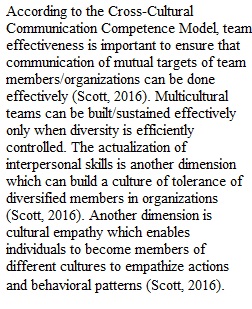


Q Introduction What does it mean to be creative? How do cultural models influence perceptions of creativity? Is creativity uniquely human? What might be uniquely American about creativity? Creativity can be very difficult to define and is a surprisingly recent term in common usage in Western cultures. In this discussion, we will explore ten Western cultural models through the lens of individualist and sociocultural research on creativity, including those on children and animals. Discussion Questions Prepare for your discussion by reviewing the required readings and videos described in each discussion topic. This activity aligns with module outcome 1. Respond to one of the following questions. 1. By browsing through books on creativity through an Internet search or browsing at your local library, choose three to explore in more depth. How do these books reflect the beliefs of ten Western cultural models about creativity discussed in the Introduction to the Explaining Creativity (Links to an external site.) text? In these books, what scientific evidence is discussed for the two kinds of creativity—individualist or sociocultural—in the Explaining Creativity text? o Note: You can also search the Excelsior College Library (Links to an external site.) for eBooks on creativity. For more information, see how to find eBooks in the EC Library (Links to an external site.). 2. After viewing the “Life at 9: Creativity (Links to an external site.)” video, discuss the ways it reflects and/or fails to reflect the 19th century Romantic era belief that formal schooling interferes with the “natural creative impulse” of children discussed in Explaining Creativity. 3. After reading “Elephant orchestra: Can animals make real music? (Links to an external site.)” from the BBC, do you think it is possible for animals to create music, or is creating music specifically a human phenomenon? In your view, is there any scientific evidence that animals could create music? If so, explain your perspective and provide a link to scientific evidence. How would you support an argument for either side of the debate? 4. Think of a creative person in your circle of family, friends, or colleagues at work. After reflecting on this week’s course materials, what makes this person creative? Would this person be considered creative in a different cultural context, or is there something uniquely American about this person’s creativity? (See The Values Americans Live By (Links to an external site.) compiled by L. Robert Kohls, which offers insight into qualities that would be viewed as uniquely American by international visitors.) Evaluation Criteria Your initial post is due by Thursday at 11:59 PM EST. Your responses to other posts are due by Sunday at 11:59 PM EST. Initial Discussion Post Your initial post should be at least 250 words and must substantively integrate the assigned readings from the module with proper APA (Links to an external site.) style formatting. You may use additional sources and materials as long as they are relevant to the discussion and cited properly.
View Related Questions